Small Mountainous Village Amazes Big World
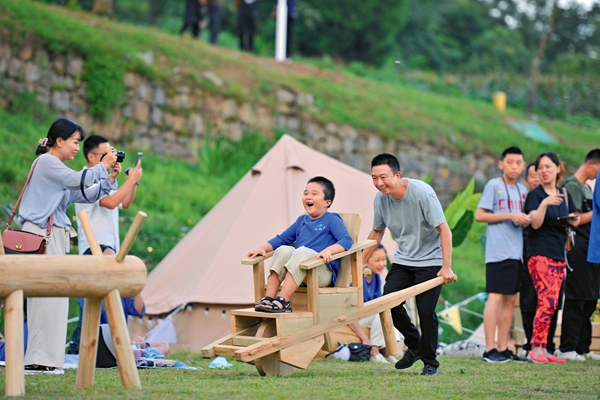
In recognition of its achievements in balancing tourism with economic development, while also adhering to environmental protection, Jingzhu, a village in Southwest China's Chongqing Municipality, has been named one of the Best Tourism Villages of 2022 by the World Tourism Organization. In recent years, the village has taken advantage of its rich natural and cultural resources to promote the integrated development of agriculture, commerce, culture and tourism; in so doing, the village has been attracting more than 500,000 tourists, from home and abroad, annually.
Jingzhu, located in Xiannushan Subdistrict of Wulong District, is 1,300 meters above sea level. The forest coverage rate of Jingzhu is 75 percent. The village boasts primitive and beautiful natural scenery, and a rich cultural heritage, such as batik dyeing and bamboo weaving.
In 2015, under the guidance of the district's Party (Communist Party of China) Committee and the district's government, the village cooperated with Chongqing Fangde Cultural-Tourism Company to focus on developing an ecotourism industry, by establishing a 4A-level tourist attraction, Guiyuan Town.
"During the overall planning of the tourist attraction, we made the utmost efforts to preserve the natural beauty of the village, and to ensure the ecological system was not ravaged," Li Pengcheng, director of the office of Xiannushan Subdistrict.
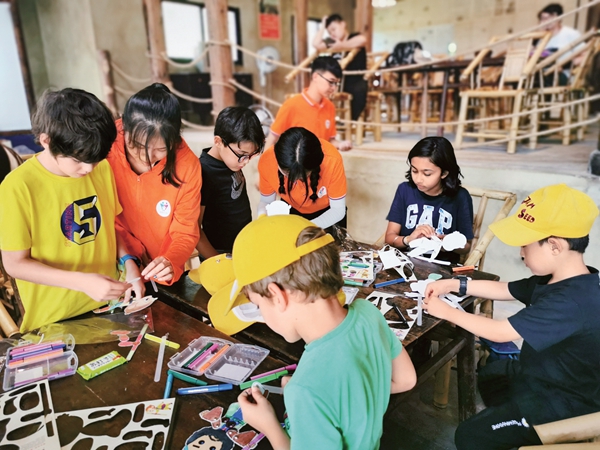
In Jingzhu Village, there is a famous scenic spot, Small Tiankeng, which is a unique landscape formed by karst landforms. Originally, the company planned to build a small theater on the site, but terminated the plan and canceled the construction after discovering bengal waterdropwort herb growing on the site. No one involved with the project wanted to destroy the herb-growing site. Small Tiankeng has retained its original appearance, and it has become a must-visit spot.
Villagers' homes have been transformed into Wuyou Library, Guiyuan Tea House, restaurants and family inns. "Jingzhu Village not only retains the lifestyle and architectural features rooted in the unique geographical and cultural environment, it also integrates contemporary design concepts into the ancient village to form a collision between the new and the old. By doing so, we not only protect the cultural value and characteristics of the original village, but also meet the practical needs (of developing ecotourism)," Li says.
The villagers have attached importance to the protection and inheritance of their folk customs, rural art, and rural intangible cultural heritage. An intangible cultural heritage inheritance and practice center, which provides a favorable platform for craftsmen and inheritors of intangible cultural heritage to demonstrate and pass on their skills to the younger generation, has been established in Guiyuan Town.
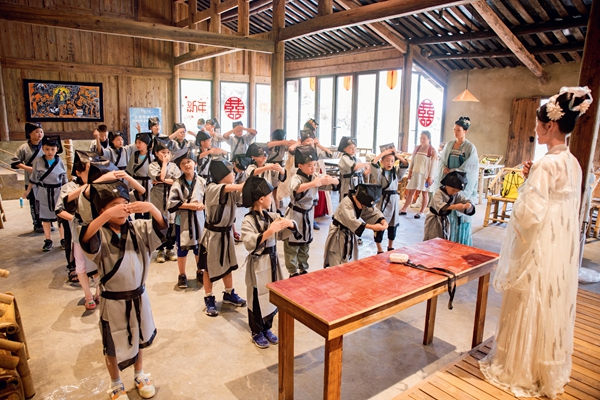
"I've been weaving baskets with bamboo for more than 20 years, but I never thought it would be so popular with tourists," says Ran Maoshu, a district-level inheritor of the intangible cultural heritage of bamboo weaving. In the center, tourists can experience the charm of various forms of intangible cultural heritage, such as batik dyeing, bamboo weaving, paper cutting and shadow play.
The villagers also organize various cultural activities for visitors, such as international summer camps, to guide children and teenagers as they learn farming culture through various farming activities.
A Spring Festival party was held on January 13 to entertain tourists. All of the programs were created and performed by the villagers. "Through the programs, we praised our new life in our hometown, and we demonstrated our cultural confidence," Chen Ju, the village's Party branch secretary, says.
Development of Jingzhu has spurred young villagers (who left to find work elsewhere in China) to return to their hometown to start their own business. Li Chengfeng is one of those returnees. "We design elegant packages for the village's special agricultural products, and we turn them into trendy gifts that are popular among tourists," she says. Her company sells more than 20 varieties of gifts, under her brand, Wulong Mountain Gift, which has become widely known among visitors.
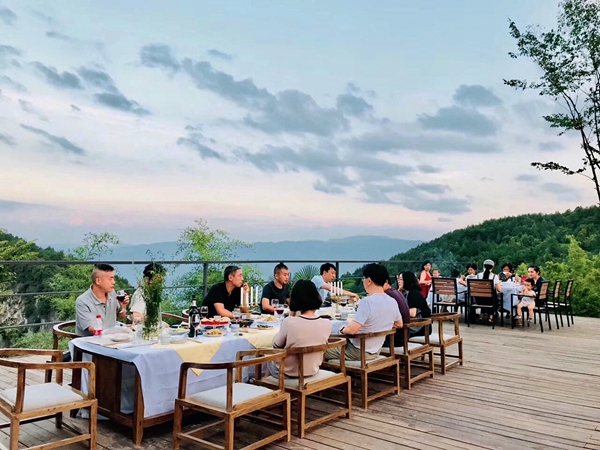
The village also established Wulong District Youth Innovation and Entrepreneurship Base, which has attracted 29 companies to conduct business there. The young entrepreneurs have contributed their wisdom to the village's revitalization and sustainable development.
Hu Lei, an agricultural expert from Chongqing, is head of a fruit-growing base in the village. "We adopt scientific planting methods, which not only reduce the pollution to the environment, but also greatly improve the taste of the fruits. The demand for our fruits usually exceeds supply," she says. Tourists can pick fruits and vegetables, and participate in farming activities, at the base, which covers about 200 hectares on the mountains.
Development of ecotourism has brought great changes to the lives of the villagers. "I had worked in the fields for several decades, and I never dreamed of becoming a barista," Ran Guangfang says.
Ran, 53, has been working as a barista at Wuyou Library for more than a year. "Most of my family members work in Guiyuan Town, and our family income has increased. We live a pleasant and satisfying life," she adds.
"By developing rural tourism, the villagers' per capita annual income has reached 21,392 yuan (US $3,056). More than half of the villagers work in the tourism industry," Chen says.
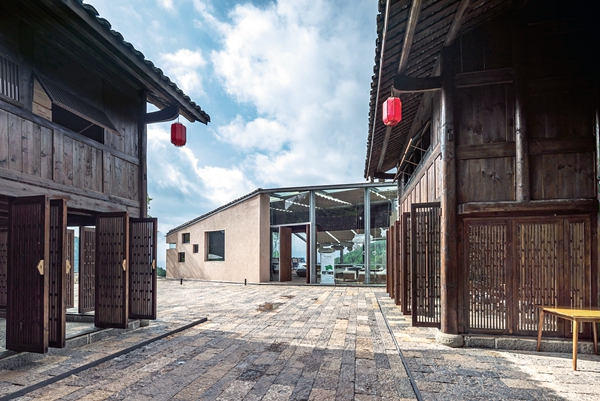
The village has promoted infrastructure construction since 2015, to facilitate development of the rural tourism industry. More than 200 water tanks have been built in the village, more than 50 kilometers of roads have been built, and more trees and flowers have been planted in the village to beautify the environment.
"Since our village began developing ecotourism, the villagers' ideas have changed a lot. We take the initiative to care for the ecological environment in the village, and we are fully aware of its importance," Yu Qianlong, a villager, says. Yu runs a 13-room family inn, and he makes nearly 60,000 yuan (US $8,572) a year.
The villagers have formulated environmental-protection plans and systems in the village's rules and regulations, and they have established a team of volunteers to maintain the village's ecological environment. "Only when the village looks comfortable, will tourists be willing to come, and will our lives be better," Yu says.
Photos Supplied by Xiannushan Subdistrict Office
(Women of China English Monthly March 2023 issue)
Please understand that womenofchina.cn,a non-profit, information-communication website, cannot reach every writer before using articles and images. For copyright issues, please contact us by emailing: website@womenofchina.cn. The articles published and opinions expressed on this website represent the opinions of writers and are not necessarily shared by womenofchina.cn.








.jpg)

 WeChat
WeChat Weibo
Weibo 京公网安备 11010102004314号
京公网安备 11010102004314号